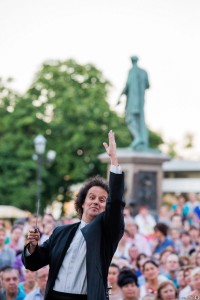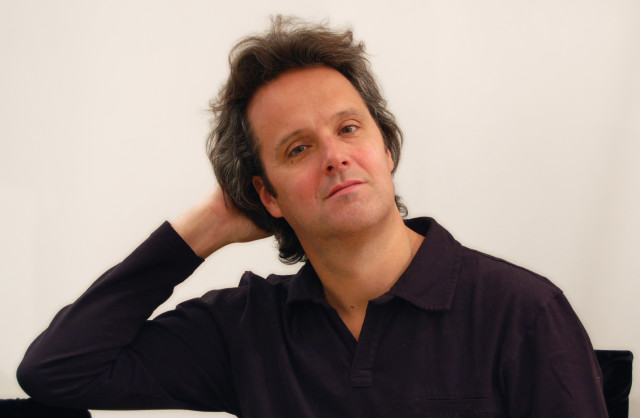
Hobart Earle has been the music director and principal conductor of the Odessa Philharmonic Orchestra for as long as independent Ukraine has existed. A cosmopolitan figure from the cradle onward, he was born and grew up in Venezuela to an American family and was educated in Scotland, America and Vienna.
Having studied with some of the greatest conductors of the 20th century, he took the plunge and moved to Odessa to become both an improbable and legendary figure in the Ukrainian cultural and music worlds. The Odessa Review’s chief editor Vladislav Davidzon interviewed him as they sat on the stage of the Odessa Philharmonic Orchestra.
Odessa Review: I am very much honored to be joined today by maestro Hobart Earle, who is music director and principal conductor of the Odessa Philharmonic Orchestra (OPO). We are sitting here in the fantastic and remarkable hall of the Odessa Philharmonic, which is a great monument of architecture which I hope the maestro will tell us a bit about.
Hobart Earle: Thank you. Absolutely, with pleasure.
OR: You are very much a historically minded conductor, you care about the history of the city, you care about the history of music. You are very much aware of the history of what has been played in the city and in the country and in the Soviet Union before that. What has the Odessa Philharmonic played recently that has never been performed in the city before?
HE: Right now, this week, Arnold Schoenberg’s “Five Pieces for Orchestra” and his 1937 version for orchestra of Brahms Op. 25. It’s safe to say that over the past year, Sibelius’s 4th, 5th and 7th symphonies were most likely Odessa premieres. In general, Sibelius’s music was not played very much in the former Soviet Union. If it had been played it would have been played from handwritten parts (because his music was copyrighted and the USSR did not sign any international copyright treaties) and if these parts existed, they’d be here somewhere. Aside from St. Petersburg (Leningrad) and Moscow, Sibelius symphonies really did not get played much, and certainly not in Odessa.
OR: Yes, relations between the Soviet Union and Finland being what they were, he was a symbol of nationalism, and he did live to a ripe old age. His works are still copyrighted, so it seems unlikely.
HE: Yes, he died in 1957. Over the years we’ve played a lot of pieces that haven’t been played here before. But how to determine what has and what has not been played here is an art of its own, sometimes a little bit of guesswork is needed. Edward Elgar is another example of a composer, who for whatever reason, was just not played in the Soviet Union. Maybe the violin or cello concerti from time to time, but not much more. Way back in 1993, when I conducted what was most definitely the Odessa premiere of the “Enigma Variations”, to my amazement it wasn’t just a premiere, but at the time, the musicians didn’t know the piece existed.
OR: Elgar, is not a particularly Soviet taste! But what do you think you have added to the history of the city, what do you think you have brought here that did not exist here before? It is after all a deeply musical city, it has a deeply rich musical history, and has produced world – class musicians for a century.
HE: No question of that, yes. I think we’ve broadened the repertoire during my tenure. Just last week, we played some Tajik music – all of which would have been Odessa premieres – Tolibkhon Shakhidi and his father Ziyadullo Shakhidi (ed: he was the founder of the Professional Tajik Academic Music) who is considered to be the father figure of Tajik music. We’ve also done a lot of contemporary music never played here, as well as a great deal of American music.
OD: A remarkable Porgy and Bess which we heard you play a week ago.
HE: Indeed, the symphonic picture from “Porgy and Bess” hasn’t been played for at least 30 years by this orchestra, that’s for sure, but the older members of the orchestra certainly remember playing it. We did Gershwin’s “Concerto in F” way back in 1992. We played a lot of Aaron Copland and also the Ukrainian premiere of Leonard Bernstein’s ‘Jeremiah Symphony,’ but also pieces like Gustav Holst’s ‘Planets’ and various Mahler symphonies. I can’t claim to have conducted the Odessa premiere of Mahler’s 1st and 5th symphonies, but certainly his 2nd, 3rd, 6th and 9th, yes, those were Odessa premieres. I don’t think Mahler’s music was played a great deal in the former of Soviet Union outside of Moscow and St. Petersburg. With both Bruckner’s 7th and 8th it’s highly unlikely they had been played here before.
OD: He had a bad reputation in the Soviet Union for the obvious historical reason of his appropriation by Hitler.
As any Viennese music student knows, it’s very easy to play Strauss badly and really hard to play him well! I often try to explain it as follows: it’s as if Strauss, in particular the waltzes, are like kind of “nineteenth century Jazz” – in other words, music that’s not played the way it’s written.
HE: Yes. To come back to your question of what I might have added to the history of the city, there is certainly the geographical component: the list of the world’s halls in which the orchestra has played. Carnegie Hall and the Kennedy Center in the United States. Five times in the Musikverein in Vienna. I studied in Vienna and I think everyone who studies in Vienna remains very attached to the city. To perform in the Musikverein is very special for any musician, and the fact that this orchestra has played there five times in the past twenty five years is wonderful. I think we’ve also managed to create various traditions locally. When I speak of Vienna, and think of Johann Strauss and our new year’s concerts (ed: these include usage of toys, mini explosive devices and confetti), these are actually much more sophisticated than they seem. As any Viennese music student knows, it’s very easy to play Strauss badly and really hard to play him well! I often try to explain it as follows: it’s as if Strauss, in particular the waltzes, are like kind of “nineteenth century Jazz” – in other words, music that’s not played the way it’s written. The waltzes are written evenly, but like Jazz, they have a rhythmic lilt to them which is very free. The Viennese have the very unique rhythmic “flow” of this music in their blood, in a way that even the Germans do not. For the Germans – and for everyone else outside the borders of Austria – it’s a foreign art form. We have built this tradition over the years and the orchestra has become really quite good at playing these waltzes. The polkas and the marches are much easier because they are in two and four, while the Waltzes are in three. Three is always an uneven element in music.
OD: Your Strauss concerts which I attended were all very popular with Odessans. People really enjoyed them and they really like Strauss as well as the little theatrical twists that you brought with the firing of the little popguns.
HE: You know, I caught a lot of “flak” for these concerts in my first years here. Strauss’s music, being a very specific repertoire, was a vehicle to develop the orchestra’s flexibility and sense of ensemble. In the early nineties I was criticized most heavily for these Strauss concerts, and for using these “tricks” you mention. Although these “tricks” have always been part of the New Year’s concerts in Vienna, in Odessa when we implemented them in the early 90s, they were considered to be horrendous!
OD: Savagery!
HE: Well, we decided to bite the bullet, and unbeknownst to those criticizing us, with those Strauss concerts we were actually improving the orchestra’s sense of ensemble!
OD: That is a very good note, a liminal note to bring us to the question of connoisseurship. After the collapse of the Soviet Union, a great deal of the social capital ebbed away, a lot of people from here moved away. They moved to the West, to Russia, Canada, Israel and Germany. It seems to me that a great deal of the cultural traditions that were passed down from generation to generation dissipated. Much of that spirit of connoisseurship goes all the way back to the nineteenth century.
HE: Yes, there is no question that times change and generations change. I’m not sure one can trace the tradition back from recent Soviet times all the way to the nineteenth century. That is of course a very interesting topic. In Soviet times, Odessa was very much closed off from the outside world. So in effect our sense of history is diluted – even now, the archives for this orchestra go back only to 1936. We don’t really know what happened in terms of orchestral music in Odessa before. That is by the way typical not only for the Odessa Philharmonic but for many performing arts organizations in the former Soviet Union. The 1930’s were the time when many of these institutions were created, or officially “re-organized”. For example, the State Orchestra of the USSR, now renamed after [conductor Yevgeny] Svetlanov was created the same year, so was the orchestra in Kiev, as well as a myriad of other institutions. Of course orchestral traditions existed here in Odessa before 1936, but it’s a tough nut to crack – and there’s no question each generation breathes its own air and drinks its own water. No question, too, that the emigration from Odessa, beginning in the 1970’s, meant there was less of a bridge to older times – and what those older times were before the 1970’s becomes guesswork. We don’t really have that many recordings – we have recordings of some of the great soloists performing, but almost no recordings of the orchestra here in Odessa. For example, with the Berlin or Vienna Philharmonic you can listen to them in the 30’s or 40’s, and there is so much more historical material. Here, it’s missing. I often make historical connections purely by musical instinct which seem to be controversial at first but then turn out to be true.
Yet, the city produced many great musicians, so there is indeed something about the city that was very special. During the time when Stolyarsky was teaching it was very fashionable to play the violin and in every courtyard there were young kids playing the violin.
OD: Give us an example of that sort of dynamic.
HE: Classic example, I conducted Shostakovich’s 5th symphony on this very stage, way back in 1994. At a particular moment during a rehearsal I suddenly stopped, and said to the orchestra: “I’m convinced there’s no way he could have written this passage, had he not heard Alban Berg’s opera “Wozzeck” !” I could just feel the musicians thinking “here he goes again” and “what’s he going on about this time? Our foreign friend telling us about Shostakovich and “Wozzeck” ?!?”… The next day the principal cellist came to the rehearsal telling me that he opened a book and found out that indeed “Wozzeck” had been performed in Leningrad in 1927 and that the young Shostakovich went to all the performances, met Berg, and was very taken by him and his music. My observation was just a gut feeling of musical instinct – neither I nor the musicians knew this fact at the time.
OD: I always ask you about the much heralded Odessa School and the imprint it has left here.
HE: Yes, but you see, what is the Odessa School? If you can find me a definition, or someone who can persuasively explain in words what it was, please let me know.
OD: So maybe it’s a spirit?
HE: The thing is if you look at the great musicians from Odessa…
OD: …they were all born here and left.
HE: Right. But look at David Oistrakh and Nathan Milstein, they are very different violinists. Look at Gilels and Richter: they are completely different pianists. Take Shura Cherkassky, he is different yet again. They are all representatives of Odessa, but they were all very different. That’s normal in any city, soloists are very individual. What unites them could well be this sense of “spirit”, that word you mention. Odessa, being a port city, this unites them – at least in their character “offstage” – with a certain kind of typical Odessan “joie de vivre”.
OD: So there is no technique that unites them all? Nothing that Gilels gave to Richter? No Stolyarsky musical school magic?
HE: They were all very original. That unites them. A lot of them had their childhood in Moscow and then came to New York, for example, after studying in Moscow. Cherkassky left very young. Yet, the city produced many great musicians, so there is indeed something about the city that was very special. During the time when Stolyarsky was teaching it was very fashionable to play the violin and in every courtyard there were young kids playing the violin.
OD: So what is the difference for you between a city like Vienna and Odessa? You came here as a young man at twenty – nine, given an opportunity to conduct your own orchestra right after the collapse of the Soviet Union. What is the most rewarding part about being the conductor of an orchestra in Odessa rather than say a city like Vienna?
HE: In a city like Vienna there are so many established traditions. If you are a music director, it’s harder to create new traditions, or, let’s put it this way – it would take more time. Here, over the years, I think we’ve managed to change a lot.
OD: What were some of the negative, pernicious traditions or issues that came along with the positive legacies of Soviet musical training? Personnel issues? Cohesion issues?
HE: Ironically, the Soviet Union tended to create people who were not always interested in the general good. More often than not, there were the sorts of people who were attuned more to their own personal interests than to the collective good. A classic example here on stage was the war over getting the curtains (which were horrible for acoustics) down in 1996. After the curtains finally came down, it was hard to make the musicians understand that they needed to fight to make sure the curtains stayed down when I was away. It was hard to get them to insist to the bureaucrats who ran the hall that the curtains needed to remain removed when the orchestra was on stage. And the bureaucrats did not want to have to expose the ill-repaired walls hidden behind the curtains on stage. My attitude to that issue was : “don’t hide this under the rug – open it up and show the public that the walls need to be repaired”.
The main issue is, the windows have yet to be properly repaired: one can hear some of the traffic sounds coming through. We can’t record here unless we stop traffic in the surrounding streets, which we did on two occasions over the years, including rerouting the trolley buses.
OD: This is a good moment to transition into your personal crusade over the much needed repair work needed for the hall.
HE: The previous governor, Ihor Palytsia, of his own initiative upon hearing the story from me, said: “let’s get this fixed”. Way back in 1996, we had the legendary American acoustician, Russell Johnson, come here to compile a major report on the hall. In that report, Russell wrote that “this concert hall could rival the great European halls” if the proper acoustical repair work and structural changes were made. Some elements of Russell’s report have been implemented. The stage was rebuilt, using a single layer of wood, for example ( before that, they kept adding layers of wood one on top of another from the 1930’s onward, and that was horrible for acoustics). New seats were installed throughout the hall – this is important because the seat backs need to reflect the sound. In any good hall the back of the seats are made of a hard material, such as wood, that reflects the sound. Johnson’s vision has yet to be fulfilled. The main issue is, the windows have yet to be properly repaired: one can hear some of the traffic sounds coming through. We can’t record here unless we stop traffic in the surrounding streets, which we did on two occasions over the years, including rerouting the trolley buses.
OD: What are you most proud to have accomplished during your tenure as the musical director?
HE: To be honest with you, I would go straight to the way the orchestra sounds. I like to use the phrase ‘dark sound’ and we also search for a kind of transparency. It is a special sound and it is a sound which is very different from that of any other orchestra in Ukraine. It is also different from the great Russian orchestras in Moscow and St. Petersburg, in that there is a ‘southern’, warm element to the sound. Perhaps not many people are aware of this, but every conductor is different, and every conductor has a very powerful effect on the sound of the orchestra he/she is conducting. Whether that effect is tangible or intangible, minor or major, if you look at the great conductors, they all had their own sound. Just compare Leonard Bernstein and Herbert von Karajan, for instance – they both conducted the Vienna Philharmonic, and each of them elicited their own different sound from the same orchestra! Every music director brings his imprint to the sound and that is what I can be proud of – this very particular sound which the orchestra has today. Another positive note should be that we have maintained the size of the orchestra, despite all the concerted efforts to reduce it over the years. Our orchestra is full-time and plays at least sixty concerts a year. In the nineties in particular there was a push to cut the size of the orchestra by as much as thirty percent and hire ringers. I resisted that effort with every bone in my body. When you do that it, it is the beginning of the end. You have to have a full sized orchestra! Today, no other orchestra in Ukraine has eight double basses full-time, and even some of the great orchestras in Moscow have only seven.
OD: What are your regrets if any?
HE: Well, the first regret must certainly have to be the hall, which of course has a somewhat tragic history. People in Odessa do not really understand to a full extent that the hall is architecturally as unique and significant as their rightly beloved Opera house. The Odessans are funny people in that to all of them the opera house is a symbol, which is of course wonderful. It is a wonderful building, but even Russell Johnson made the point that he would not rank this building that far below the Opera house in terms of its architectural importance. He said to me: what sets this city apart is that it has both a great Opera house and a great hall. Most cities only have one of the other. For years, we have been fighting this terrible legend, spread by Leonid Utesov’s joke on this very stage, that the acoustics are bad, because the hall was built as a stock exchange and built so that nobody standing over there could overhear our conversation here. A wonderful story, but the trading room was elsewhere in the building, and today’s concert hall was used as a hall for banquets and ceremonies. According to Russell Johnson, there is nothing about this hall’s soul which is anti-acoustical, only a few specific elements – such as the windows – that do need to be changed. We need to install wooden shutters over the windows to reflect the sound, and the windows need to be isolated, so the ambient street sounds stay outside. I can’t say that I have been able to get the local government to focus on the windows. I can’t say that we have achieved what we wanted to. If this hall was to be redone correctly it would become a real destination for classical music. Secondly, the international market is very difficult, and – despite the clearly established success that the orchestra has had, both in Europe and North America for a number of years now – we have been unable to establish ourselves on a regular basis with Western tours. Unfortunately, and also kind of unfairly, this is in part because the orchestras from St. Petersburg and Moscow have a huge lion’s share of that market and those cities have the kind of name recognition that Odessa just doesn’t have. I think the orchestra has deserved its fair place in the international market, but alas, we don’t seem to have it. This I do genuinely regret.
OD: Yet you have had some remarkable world class musicians perform here despite all the difficulties.
HE: Getting big names to Odessa is a whole problem. A lot of the names of stature internationally, with whom I perform abroad, such as Ivo Pogorelić or Steven Isserlis, Daniel Mueller Schott, the orchestra simply cannot afford to pay them to come here. There is a very limited budget for guest artists. I have had conversations with people like Yo-Yo Ma, Gil Shaham and Joshua Bell about coming to Odessa. They are all interested. We have had some major artists come to perform here, like Yefim Bronfman and Piotr Anderszewski, who are great pianists and very well known worldwide, they have certainly never come to play with the orchestras in Kiev or elsewhere in Ukraine. They enjoyed being here, but they came as a gesture of friendship, basically for pocket change. We have a serious financial problem.
We pay taxes into the local budget without receiving one Hrivna of subsidy – all of our subsidies come from Kiev and all our taxes go back out to the Oblast (regional authorities). So bearing that in mind, the local government should at the very least be giving moral support to the orchestra which costs them nothing and which is a major tourist and cultural attraction. They have not really understood the value of the orchestra’s ambassadorial role for the city.
OD: The local government does not help very much?
HE: We pay taxes into the local budget without receiving one Hrivna of subsidy – all of our subsidies come from Kiev and all our taxes go back out to the Oblast (regional authorities). So bearing that in mind, the local government should at the very least be giving moral support to the orchestra which costs them nothing and which is a major tourist and cultural attraction. They have not really understood the value of the orchestra’s ambassadorial role for the city. In terms of support, we have had private charitable funds both here and in the United States, and these funds did all sorts of things. We even did dental work for wind players so that they could continue to play fifteen years ago. It turned out to be a very important issue, I had one horn player who had a number of teeth pulled by an idiot dentist and so he could not put his dentures in and was completely unable to play.
OD: That is not the kind of problem we have in the west.
HE: We were very fortunate and found a French-Swiss dentist who told us he could fix this. Our man is still playing the horn, his son is our principal horn player. While we were at it, we decided to do the same for all the other wind players as they all had serious dental issues. We also did things in the 90’s like bring vitamins for the musicians. That was all funded by a charitable fund, a 501 C3 that we had in the U.S. – the ‘American Friends of the Odessa Philharmonic Orchestra’. We no longer have it because the IRS closed out many of those foreign funds which were not functioning for long periods because of money laundering and terrorism concerns. You need an entire team of people to operate that sort of structure properly, and we were not able to maintain such a team from a long distance, that is unfortunate. The new class of nouveau riche here in town also don’t seem to be interested in traditional philanthropic endeavors, and it is true that there is no legal framework or tax deduction structure for it here either. The general apathy here has been disappointing. Even though we’ve had support from time to time, there has been a general indifference over the years from the local government, and also from local business.
OR: And what about the effects of recent events? Have they been detrimental?
HE: We are just now beginning to see proposed budget cuts – for the first time since the start of the war – of almost 10%, and this is very unfortunate. The national government is the only institution in this day and age here in this country who can properly support the arts. Ukraine is a country of a very high culture, and I’d like to think of it as a country where this is one of the best things it has going for it. If the federal government starts to cut funding for culture and to go down the road that a lot of European governments have gone down… well that is a very bad road to go down. Very sad news. Which is not going to solve the budget problem of the country either. The amount of money that the government spends is significant – if you add up the total of all the national level arts organizations – but it’s not significant at all in terms of the percentage of the national budget. People who are leaders in society need to lobby against these proposed budget cuts, only that way can we resist them.
OR: So let’s conclude on a happy note. You and the orchestra defy all the expectations of fussiness and conservatism often associated with classical music. You put on popular music, in the good sense of popular, and in fact you were the first to bring film scores to the classical scene here, which is of course common in the West.
HE: Correct. And yes, film scores are also easy to play badly. They are very demanding on the orchestra, and we need to be good to play them well. For the annual “city day” concert, we have played a diverse repertoire of Western European, Hungarian, Latin and North American, Romanian, Greek and Turkish music, as well as pieces representing Asia and almost all fifteen former soviet republics. Multi-national music for the multi- national city of Odessa. A lot of it is easy to listen to but hard to perform.
OR: Odessa and the many musicians who worked here had a great tradition of creating some of the best of Soviet popular music. There was the aforementioned Utesov, Isaac Schwarz as well as my own composer ancestor- Isaac Dunaevsky.
HE: Sure, the two Issacs! When I speak of the two Isaacs however, this being Odessa, I think of a third. We had a very special concert with the third Isaac, who was of course Babel. We had a wonderful evening with Babel’s grandson Andrei Malaev-Babel, he read some of the Babel stories interspersed with music by Isaac Schwarz. But Dunaevsky – he was a wonderful musician and we’ve played much of his music, including his “Concert Waltz” – which, by the way is purely a concert piece, not from film or operetta. It is sad to note Dunaevsky is almost completely unknown outside of our neck of the woods, despite his great talent as a musician. But that’s the way life goes. There is so much – on all sides – that we don’t know about each other. Would you believe that the orchestra did not know who Stephen Sondheim was? I discovered that last week, while explaining the lyrics of “Porgy and Bess” to them. I also explained to them something that most people, even in America don’t know: Sondheim was Milton Babbitt’s last private student. For that matter, many people don’t know that Leonard Bernstein’s parents were from Berdichev and Shepetovka …
OR: How remarkable it is to have a Venezuelan born, Scottish and Viennese-educated American, a student of Babbitt and Leonard Bernstein (whose own family was from this part of Ukraine) explaining Sondheim to the Odessa orchestra. That really brings the circle all the way back around.




































